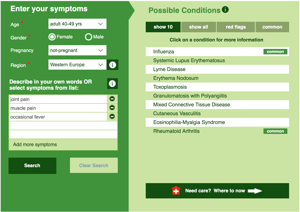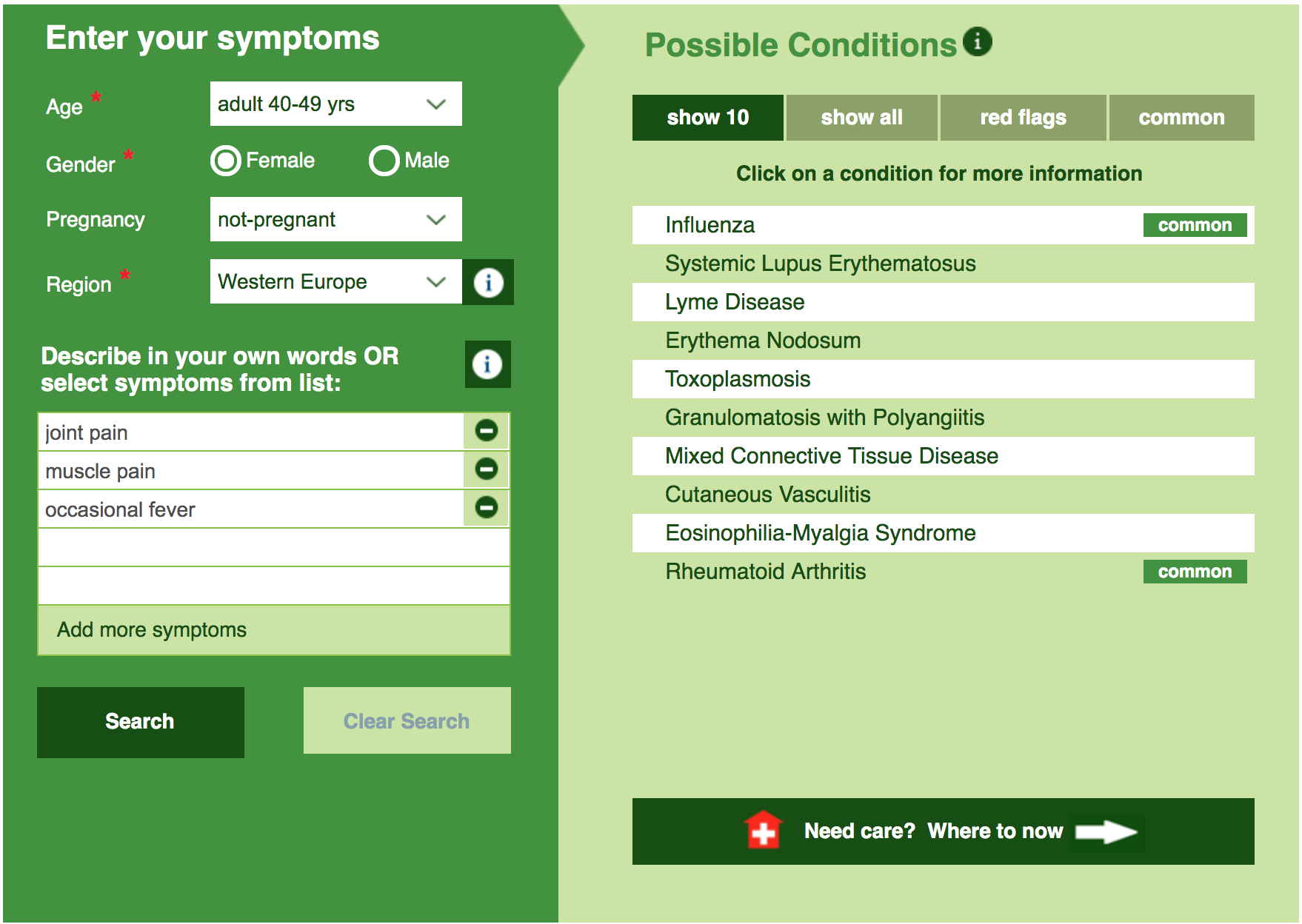- Privacy Policy
- Terms & Conditions
- Contact us
- ©Isabel Healthcare 2025
Could I have Lupus? Lupus symptoms and diagnosis
 May 10th is World Lupus Day, when charities around the world aim to raise awareness of the often devastating impact this disease can have on the lives of sufferers. Raising funds for research into a cure is one aim of World Lupus Day. Increasing awareness, however, of the many symptoms of lupus, is also key as early diagnosis is critical in helping to prevent major organ damage, and in extreme cases, failure.
May 10th is World Lupus Day, when charities around the world aim to raise awareness of the often devastating impact this disease can have on the lives of sufferers. Raising funds for research into a cure is one aim of World Lupus Day. Increasing awareness, however, of the many symptoms of lupus, is also key as early diagnosis is critical in helping to prevent major organ damage, and in extreme cases, failure.
What is Lupus?
Lupus is a chronic, autoimmune disease which can damage any part of the body from your skin, to your joints or organs. It most commonly affects the kidneys, but it can also affect the heart, lungs and brain. Chronic means the symptoms last over a long period of time. Autoimmune means your immune system, the part of the body which normally fights off bacterias and viruses using anti-bodies, can no longer tell the difference between the foreign invaders and the healthy tissue, so instead creates auto-antibodies which mistakenly attack and destroy the healthy tissue, causing pain, inflammation and damage on their way.
More than 5 million people worldwide struggle with the many health consequences of lupus and while it can affect anyone, the condition most commonly affects women between the ages of 15 and 44. Until recent years, lupus was widely regarded with alarm, but as more and more is understood about the condition, the prognosis has greatly improved and if recognised reasonably early, the disease can be brought under control, with many patients going into a period of remission after a few years.
Causes of Lupus
It’s still not fully understood what causes the disease but scientists have come up with a few common factors which make the condition more likely in some people than others:
- Certain genes have been identified as contributing to the development of the disease and there does seem to be a link in families. Often a patient with lupus will have family members with other autoimmune conditions, such as MS, thyroid problems, raynauds and scleroderma
- Over exposure to ultraviolet rays from the sun, which activate inflammatory cells in the skin
- Prolonged use of some medicines
- Previous infections and stress
- Hormonal changes, ie puberty, childbirth and the menopause, can often be a trigger for lupus
It is worth stressing that lupus is not infectious: you can’t catch it, nor can you pass it on to someone else.
Lupus signs and symptoms
One of the reasons lupus sometimes takes a while to diagnose is because symptoms seem to vary from one person to the next. Lupus also shares common symptoms with other conditions, again leading to a delayed diagnosis. Joint pain, for example, can often be mistaken for early rheumatoid arthritis, the only difference being that in lupus the joints are not damaged. The most common symptoms are an overwhelming tiredness that won’t go away, and joint and muscle pain or stiffness. In addition to this, any of the following could be linked to the disease:
- Skin rashes, often on your cheeks or nose
- Dry, scratchy eyes
- Depression
- Hair loss
- Intermittent fevers
- Swollen glands
- Weight loss
- Poor circulation in fingers and toes or sudden swelling of the feet, ankles or hands. This is caused by inflammation of the kidneys which, if left untreated, can ultimately lead to kidney failure.

How is Lupus diagnosed?
In order to prevent organs from being damaged, early diagnosis is vital. While there is no one test which will definitively diagnosis the condition, blood tests revealing high levels of a particular type of antibody, combined with typical symptoms, mean lupus is likely. Your family’s and your own medical history should also be taken into account.
Treating Lupus
While there is currently no cure for lupus, sufferers who manage to get treatment in the early stages of their illness usually respond very well. Lupus patients are usually treated by a rheumatologist, though depending on your symptoms, you could also be treated by a renal expert, a cardiologist, dermatologist or obstetrician. Lupus is generally treated with anti-inflammatory drugs, steroids and antimalarial drugs and, in more severe cases, immunosuppressant medication. Each patient will have a tailor-made treatment depending on the symptoms they are suffering from. But the key to good treatment is ultimately early recognition of the condition. Allowing yourself to rest when the tiredness takes over is key to preventing future flare-ups of other symptoms, as is following a healthy diet, not smoking and taking regular exercise. Lupus is a condition which naturally improves and worsens at different times - flare-ups are often caused by certain triggers that you will come to recognise. These can include:
- Exposure to sunlight
- Not resting enough
- Infections
- Stress
Learning to recognise these triggers and manage your symptoms allows you to stay in control of your illness and not allow lupus to dominate your life.
If, after reading this, you think you may be suffering from lupus or are concerned about your symptoms, try entering them into the Isabel Symptom Checker and show the results to your doctor.
Subscribe Here!
Recent Posts
Isabel DDx Companion with ChatGPT Integration - to help you diagnose even faster
At Isabel Healthcare, we’ve always been driven by one goal: to make clinical reasoning faster,..Virtual Triage: Do more questions lead to better patient outcomes?
One of the common misconceptions related to virtual triage / symptom checker tools is that the more..List Of Categories
- Differential Diagnosis Decision Support
- Differential diagnosis
- Symptom Checker
- Symptoms
- Medical Error
- Patient Disease Information
- Disease
- Clinical Decision Support
- Diagnostic Decision Support
- Isabel 1 Minute Read
- Diagnosis Error
- Diagnosis Skills Cases
- Healthcare Informatics
- Clinical Reasoning
- Evidence-based Medicine
- Medical Education
- Patient Engagement
- Symptom Triage
- Nurse Practitioner Education
- Nursing Decision Support
- Partnership
- Public Health
- COVID-19
- EHR
- Patient Empowerment
- Patient Safety
- rare disease

Start your FREE Trial today
Try the Isabel Pro DDx generator for 30-days - no payment card details required.




